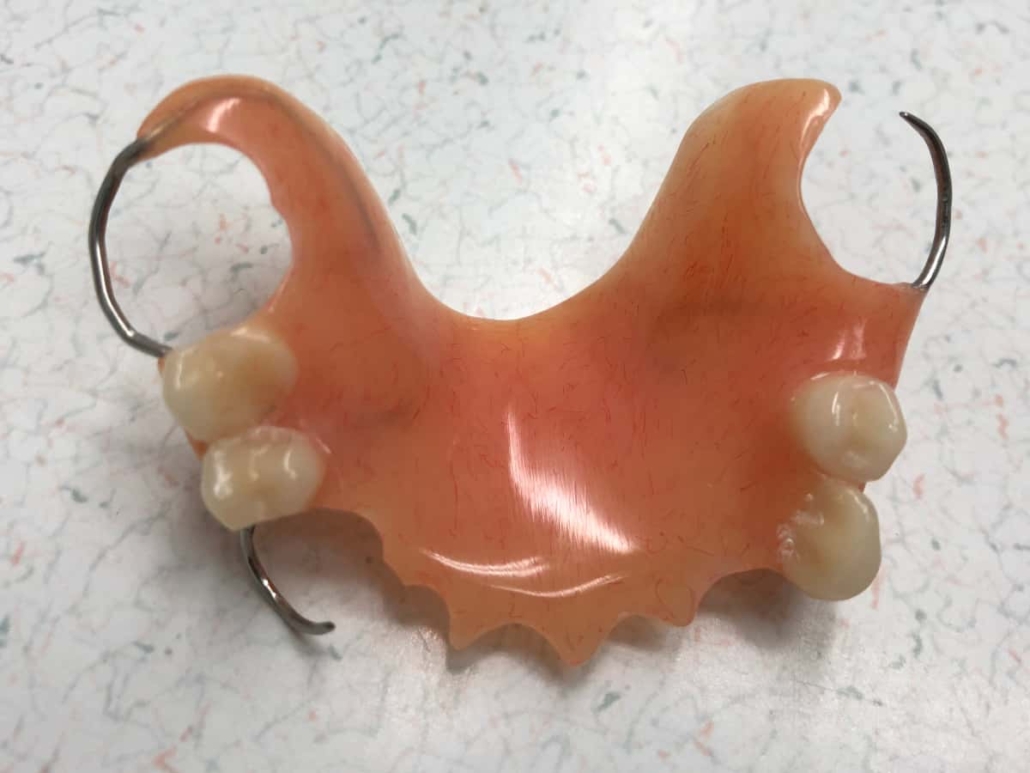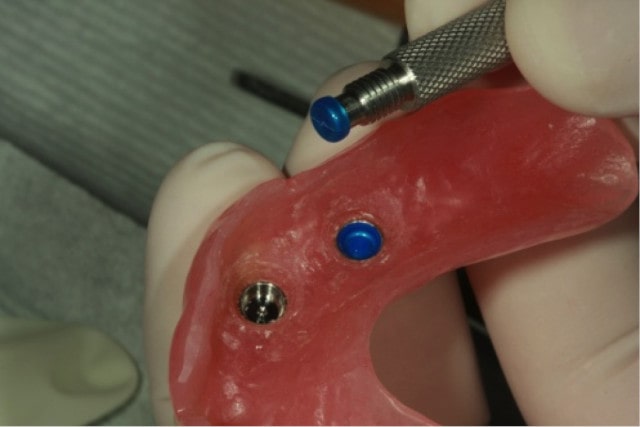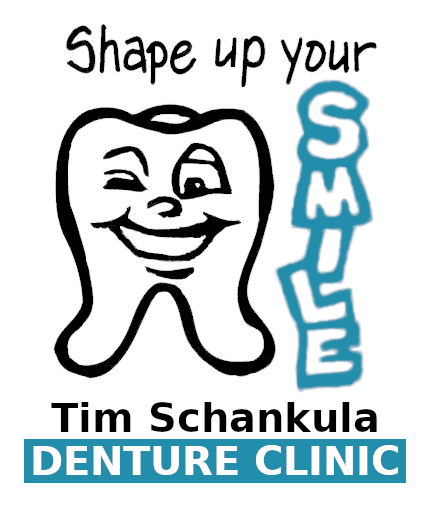 If you are feeling any pain or discomfort with your denture, you only need to give us a call to book an Adjustment, which can usually be done on the same day you called. Note that adjustments do require an appointment. With our lab on site at the Grantham Denture Clinic, your denturist can apply small Adjustments to your denture to make it fit and feel better, with you right there to say if it’s better, or not quite. That’s the advantage of having an on-site laboratory. Because Adjustments involve grinding away some pink acrylic from the underside of the denture, micro-adjustments can be made in an iterative way, each quick, with multiple tiny Adjustments done to relieve a pressure rather than a single bigger Adjustment.
If you are feeling any pain or discomfort with your denture, you only need to give us a call to book an Adjustment, which can usually be done on the same day you called. Note that adjustments do require an appointment. With our lab on site at the Grantham Denture Clinic, your denturist can apply small Adjustments to your denture to make it fit and feel better, with you right there to say if it’s better, or not quite. That’s the advantage of having an on-site laboratory. Because Adjustments involve grinding away some pink acrylic from the underside of the denture, micro-adjustments can be made in an iterative way, each quick, with multiple tiny Adjustments done to relieve a pressure rather than a single bigger Adjustment.
Types of Denture Adjustments
There are two principal occasions when Adjustments are needed:
 (1) Insertion Adjustment: The first is immediately or soon after what’s called the Insertion Appointment. This is the appointment in which you are getting your finished denture inserted into your mouth—either a brand New Denture or your Existing Denture that has been altered in some way after getting a Reline or Rebase procedure performed on it or Teeth Added Onto Your Partial Denture because you lost more of your own natural teeth. Your denturist inserts the finished denture into your mouth, and you report either all feels good, or you feel some discomfort somewhere and point it out to your denturist. If there is some discomfort or pain, your denturist can then take the denture around the corner into the lab, make the adjustment, and then bring it back to you in the operatory where you are sitting in the dental chair to try it in again. As already mentioned, there may be a little back and forth between the lab and the operatory—to get it to feel just right. You may even take the denture home and call us a few days later to book an extra Adjustment Appointment (you may even need more than one). It is quite common and normal to need these Micro-Adjustments.
(1) Insertion Adjustment: The first is immediately or soon after what’s called the Insertion Appointment. This is the appointment in which you are getting your finished denture inserted into your mouth—either a brand New Denture or your Existing Denture that has been altered in some way after getting a Reline or Rebase procedure performed on it or Teeth Added Onto Your Partial Denture because you lost more of your own natural teeth. Your denturist inserts the finished denture into your mouth, and you report either all feels good, or you feel some discomfort somewhere and point it out to your denturist. If there is some discomfort or pain, your denturist can then take the denture around the corner into the lab, make the adjustment, and then bring it back to you in the operatory where you are sitting in the dental chair to try it in again. As already mentioned, there may be a little back and forth between the lab and the operatory—to get it to feel just right. You may even take the denture home and call us a few days later to book an extra Adjustment Appointment (you may even need more than one). It is quite common and normal to need these Micro-Adjustments.
 (2) Adjustments Over Time: The other principal occasion Adjustments are needed are when small changes occur to your gums, tissues and jaw bones over time such that now the denture is no longer fitting perfectly. This is also natural. Anytime you feel a sore spot developing as a result of such changes—feel some discomfort or pain that you didn’t feel before due to your denture making micro-movements that rub on your gums—just call us to book an Adjustment.
(2) Adjustments Over Time: The other principal occasion Adjustments are needed are when small changes occur to your gums, tissues and jaw bones over time such that now the denture is no longer fitting perfectly. This is also natural. Anytime you feel a sore spot developing as a result of such changes—feel some discomfort or pain that you didn’t feel before due to your denture making micro-movements that rub on your gums—just call us to book an Adjustment.
Note this type of Adjustment is for tiny changes that occur to your mouth. If instead your dentures feel quite loose as a result of bigger changes to your gums, tissues and/or jaw bones, then you may need a Reline or Rebase, in which new impressions are made of your mouth based on the current state of it as a result of these changes, and then your existing denture is altered in a more significant way to match your mouth.
There are two other occasions when Adjustments are needed, depending on the particular type of denture you have:
 (3) Clasp Tightening on Partial Dentures: Another kind of Adjustment is altogether different and is required for different reasons: if you have an existing Partial Denture, it not only can be prone to needing the regular kind of Adjustments to the underside of the acrylic base—the part that touches your gums (discussed in #2 above)—but sometimes it just needs the clasps adjusted—the metal hooks that wrap around your natural teeth to hold the denture in. In this case, the denturist does one or more Micro-Adjustments of bending the clasps slightly so that they hold onto your natural teeth better. The reason these types of Adjustments are needed are again due to tiny changes to your mouth. Please don’t try to do this at home: let your very experienced denturist perform the Micro-Adjustments.
(3) Clasp Tightening on Partial Dentures: Another kind of Adjustment is altogether different and is required for different reasons: if you have an existing Partial Denture, it not only can be prone to needing the regular kind of Adjustments to the underside of the acrylic base—the part that touches your gums (discussed in #2 above)—but sometimes it just needs the clasps adjusted—the metal hooks that wrap around your natural teeth to hold the denture in. In this case, the denturist does one or more Micro-Adjustments of bending the clasps slightly so that they hold onto your natural teeth better. The reason these types of Adjustments are needed are again due to tiny changes to your mouth. Please don’t try to do this at home: let your very experienced denturist perform the Micro-Adjustments.
 (4) Nylon or O-Ring Replacement on Implant Dentures: Finally, an Implant Denture has what are called Nylons Inserts—for Locator type Implants (or O-Rings for Ball type Implants)—that are inside the metal Housings embedded within the denture’s base and function to keep the Implant Denture securely fastened onto the Implant Posts inside the mouth. These nylons (or o-rings) wear out from time to time and therefore need to be replaced by your denturist. If your Implant Denture is not holding well anymore, give us a call to book a Nylon (or O-Ring) Replacement appointment, which usually takes about 20-30 minutes. Again, note that we’re talking about not holding well onto the Implant Posts themselves, needing a replacement of the nylons or o-ring; this is different from a Reline or Rebase. The frequency of needing replacement of the nylons or o-rings varies between every 6 months, and every 3 years: how often depends on many factors that you can discuss with your denturist.
(4) Nylon or O-Ring Replacement on Implant Dentures: Finally, an Implant Denture has what are called Nylons Inserts—for Locator type Implants (or O-Rings for Ball type Implants)—that are inside the metal Housings embedded within the denture’s base and function to keep the Implant Denture securely fastened onto the Implant Posts inside the mouth. These nylons (or o-rings) wear out from time to time and therefore need to be replaced by your denturist. If your Implant Denture is not holding well anymore, give us a call to book a Nylon (or O-Ring) Replacement appointment, which usually takes about 20-30 minutes. Again, note that we’re talking about not holding well onto the Implant Posts themselves, needing a replacement of the nylons or o-ring; this is different from a Reline or Rebase. The frequency of needing replacement of the nylons or o-rings varies between every 6 months, and every 3 years: how often depends on many factors that you can discuss with your denturist.
Number of Appointments
Adjustments
(usually same day you call, 1 appointment)
Adjustments can usually be done on the same day, as long as there is an opening, or the next day in open spots on the schedule, and you usually only need that single appointment. Your denturist will usually be able to make the adjustment(s) while you sit in the dental chair:
(1) Adjustment
However, sometimes multiple adjustment appointments are needed, especially for a brand new denture. This is normal. Your denturist is patient and only wishes for your denture to fit well and comfortably, without any discomfort. It is better to make tiny, more incremental adjustments sometimes, rather than a too large one that cannot as easily be reversed. Between adjustments you use the denture for a couple of days to see it the last adjustment did the trick. If it didn’t, you just call us to book another adjustment appointment.
Feeling some discomfort with your denture?
Just call us to book an Adjustment appointment.
Feeling some discomfort
with your denture?
Just call us to book
an Adjustment appointment.






